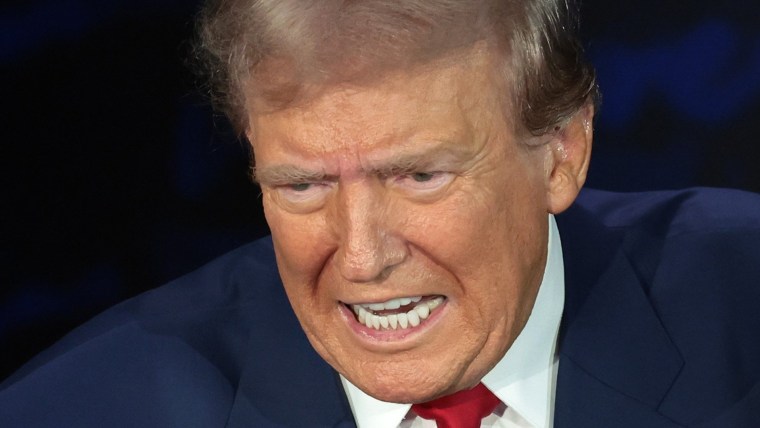In July, after Donald Trump was targeted in an assassination attempt, the Republican did not immediately lash out at his perceived political foes. The former president’s restraint did not last long, however, and he ultimately started blaming his critics for the shooting — without any evidence, of course — and amplifying conspiracy theories.
As recently as a few weeks ago, Trump was blaming the Biden administration for the attempt on his life — officials “weren’t too interested in my health and safety,” he told television personality Phil McGraw — and after another conservative media ally questioned whether the shooting might’ve been an “inside job,” the former president responded, “You do have to wonder.”
In the wake of Sunday’s apparent assassination attempt, the Republican candidate is already on the offensive and pointing fingers without regard for evidence or propriety. Less than 24 hours after the alleged would-be shooter was taken into custody, Trump told Fox News Digital that the suspect “acted” on “highly inflammatory language” of Democrats.
“He believed the rhetoric of Biden and Harris, and he acted on it,” Trump said of the gunman in an interview with Fox News Digital. “Their rhetoric is causing me to be shot at.” ... Trump pointed to Biden and Harris’ past comments casting Trump as a “threat to democracy,” while telling Americans they are “unity” leaders.
In case that was too subtle, the former president also published a statement to his social media platform condemning Vice President Kamala Harris’ debate rhetoric, adding: “Because of this Communist Left Rhetoric, the bullets are flying, and it will only get worse!”
So, a few things.
First, the investigation into the alleged would-be shooter is just beginning. The idea that the former president can speak to the suspect’s motivations, in detail, is difficult to take seriously. Given the preliminary evidence, Ryan Wesley Routh’s politics were, to put it mildly, idiosyncratic, supporting Republican, Democratic and independent candidates — including, in 2016, Trump himself. To characterize him as some kind of lifelong Democratic partisan is a stretch.
Second, Trump clearly sees accusations that he’s a “threat to democracy” as beyond the pale, but, in reality, the Republican candidate really has endorsed an authoritarian-style vision that would undermine democracy. This assessment is based almost entirely on Trump’s own rhetoric and public statements. When the former president’s critics, in Democratic politics and elsewhere, accuse him of being a threat to democracy, their case is rooted in fact.
Third, these assessments aren’t just coming from the left. Trump’s own former defense secretary, Mark Esper, has described the former president as a “threat to democracy.” The Washington Post’s Bob Woodward, who remained neutral in every presidential race throughout his lengthy career, made an exception for Trump, calling him a “threat to democracy.” Retired federal Judge J. Michael Luttig, a giant of conservative jurisprudence, directly accused Trump and his allies of waging a “war on democracy,” adding that the former president is a “clear and present danger” to American democracy.
Fourth, if Trump genuinely believes that accusations about “threats to democracy” are beyond the pale, he should probably take a moment to explain why he keeps accusing people he dislikes of being “threats to democracy.” At last week’s presidential debate, for example, he pointed at his Democratic rival and declared, “They talk about democracy. ‘I’m a threat to democracy.’ They’re the threat to democracy.”
In fact, literally just a few hours before Sunday’s apparent assassination attempt, the GOP nominee published an item to his social media platform that read in its entirety, “THE FAILING NEW YORK TIMES IS A TRUE THREAT TO DEMOCRACY!” By Trump’s reasoning, if someone were to target Biden, Harris or the nation’s most widely read newspaper, would he be responsible for the violence?
Fifth, the hypocrisy surrounding the former president’s latest rant was staggering. In the same interview with Fox News Digital in which he accused Democrats of creating security threats by using caustic rhetoric, Trump said Democrats “want to destroy our country” and are currently “destroying the country.” He added — again, in the interview in which he was arguing that Democrats ought to dial down their comments — that Democrats are “the enemy from within” and “the real threat.”
“They use highly inflammatory language,” Trump went on say, referencing his partisan detractors. “I can use it too — far better than they can — but I don’t.” Evidently, in his reality, Trump is unaware of his own choice of words.
To be sure, I’m mindful of the circumstances. Trump doesn’t want to be criticized, and he would love nothing more than to bully Democrats into pulling their punches in the campaign’s final 50 days, even as he condemns them in increasingly hysterical terms. Many Republicans apparently want the public to believe that it’s dangerous to tell voters that a dangerous candidate is actually dangerous.
Indeed, one notable politician asked over the weekend, “Are we not allowed to talk about these problems because some psychopaths are threatening violence?”
The question came from Trump’s running mate, Sen. JD Vance.

